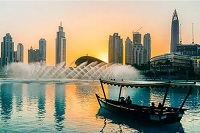 Business activity in Dubai’s non-oil private sector economy continued to strengthen in November, albeit at a softer pace, as new orders and output improved amid the continued economic momentum in the emirate.
Business activity in Dubai’s non-oil private sector economy continued to strengthen in November, albeit at a softer pace, as new orders and output improved amid the continued economic momentum in the emirate.
According to The National, Dubai’s seasonally adjusted S&P Global purchasing managers’ index reached 56.8 in November, slightly lower than the 57.4 recorded in October, remaining well above the neutral 50-mark separating an expansion from a contraction.
Inventories also continued to rise at a historically rapid pace in the penultimate month of the year, reflecting a sharp improvement in business conditions across the emirate’s non-oil economy.
While new order growth also stayed above the survey’s trend, November data indicated a softer increase after hitting the 52-month record in October. Sales momentum also slowed to its weakest level since August amid increased market competition.
Dubai’s economy, which sustained its growth momentum from last year on the back of strong trade and tourism, grew by an annual 2.8 per cent to Dh111.3 billion ($30.3 billion) in the first quarter, according to official data released in August.
It is forecast to grow by 3.5 per cent in 2023, after expanding by 4.4 per cent last year, according to Emirates NBD.
Dubai’s property market has also rebounded strongly from the coronavirus-induced slowdown, helped by government initiatives such as residency permits for retired and remote workers, and the expansion of the 10-year golden visa programme.
Dubai recorded 116,116 new property transactions worth about Dh429.6 billion in the first nine months of 2023, according to the latest data from the Dubai Land Department.
The emirate’s residential market achieved its highest quarterly price rise in a decade in the third quarter, according to property consultancy ValuStrat.
Meanwhile, Dubai International Airport said in November it expects to exceed pre-coronavirus levels this year with a forecast of 86.8 million travellers, driven by strong growth in the first three quarters of the year.
Dubai, the commercial, financial and trading centre of the Middle East, is pursuing its ambitious D33 road map that aims to catapult it into the world’s top cities by economic strength by 2033.
The economic agenda includes 100 transformative projects with an aggregate economic target of Dh32 trillion, including the doubling of foreign trade to Dh25 trillion during the next decade.
The agenda also aims to boost the contribution of foreign direct investment to Dubai’s economy to $177 billion over the next 10 years and add Dh100 billion to it annually through digital transformation.
Employment in the emirate also improved in November, albeit at a softer pace than October.
However, companies were keen to build inventory levels last month, as non-oil businesses surveyed reported another steep expansion in their stocks of purchases, with the overall uplift being the second fastest in about six years.
November data also indicated a solid increase in input prices across the Dubai non-oil economy.
Although the rate of inflation eased from October, it was the second quickest recorded since July 2022, according to the survey. (NewsWire)
